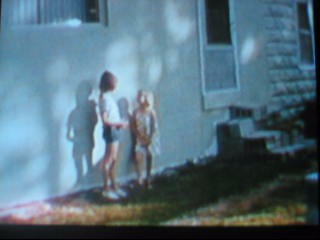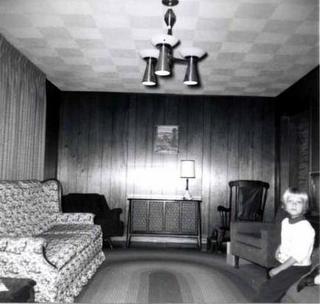June 1965
My sister and I slept in a walk-through room; it was actually more like a landing or an alcove under the eaves at the top of the stairs. There was a door at the bottom of the stairs, but it was never closed, and there was no door to our room. There was a door separating my brothers’ room from our space. Passing through “the girls’ room” into my brothers’ room was like stepping outside the Gale farmhouse and into the Land of Oz. Their room was all done in matching pale wood; it had prominent grain, golden swirls like wet blond hair floating underwater, elegant and fluid. There were matching drawer pulls and knobs on all the furniture and a nice tile floor, black with colored flecks like someone had tossed confetti in the air. They had built-in beds, one on each side of the room, with drawers for storage underneath, and a window overlooking the driveway at the front of the house. Reading lamps, tiny stars cut into the metal shades, sprouted from the walls over their beds. There was a built in bookcase under the window, and it was filled with books, Zane Grey, and later, Ian Fleming: boys’ books. On my oldest brother’s side of the room there was a desk with two chairs, and drawers, space for each of them to have things, stuff, possessions. Small cupboard doors led to the crawl space under the roof at the foot of each bed, storage for more of their stuff. On the other side was a closet; there was a mirror attached to the door, also a tie and belt rack. To the right of that, facing into the room, was a built in bureau.
What my sister and I had was this: the paneling on the walls didn’t match. My father took scraps that were leftover from elsewhere in the house and nailed them up over the studs, a faux wood patchwork quilt. Parts of the room, especially one area over by the “closet,” which was a gap in the wall studs with a dowel stuck in to it, had no paneling at all covering the insulation; pink, itchy fiberglass oozed out. We shared this closet, which had no door. We had no mirror. Even after my oldest brother got married and moved out and my younger brother was away at college, we stayed in our “room,” while theirs sat empty. While other areas of the house, my father’s den, the basement, were worked on and fixed up, no one ever spent any time or effort on our “room;” it never occurred to any of us to try to fix it up.
That room and the house as a whole was never exactly a haven of solitude or comfort; sadness, fear and violence eddied through the house, swirling in the air, as constant as my father’s cigarette smoke, relentless tendrils stretching into every corner. The house, and that space, holds a singular and powerful attraction for me, as someone might feel the lure of an old lover whose hurt and neglect, with the passage of time, seem insignificant compared to the possibility that they could change: you just know it would be different, you could finally be happy, if you could only go back and fix it all up.
The house was up for sale last year; my husband and I went to see it. It had passed though several different owners since my father sold it and we moved away, I thought by now it would be a different house. I was surprised to see that the most drastic change to the house was a coat of paint on the outside. What had been “the girls’ room” was now a sitting room for the person who slept in my brothers’ old room. There was a flimsy sliding door on the closet; other than that, the “room,” aside from different furniture, was unchanged. As we toured the house, walking slowly and nodding as the owner explained this and that about it, I fantasized about buying it and redoing everything.
I imagined ripping out the old mismatched paneling and pink fiberglass. I pictured the sloping eaves plastered, maybe painted a crisp white: a fresh, light, bare-walled new start. I saw the dormer window expanded to a skylight, the space filled with daylight and fresh air. I thought if I threw open all the windows and aired out the house maybe I could also clear out the sadness, fear and violence that still swirl around inside me. I thought it might all be so different, if I could only go back and fix it all up.





